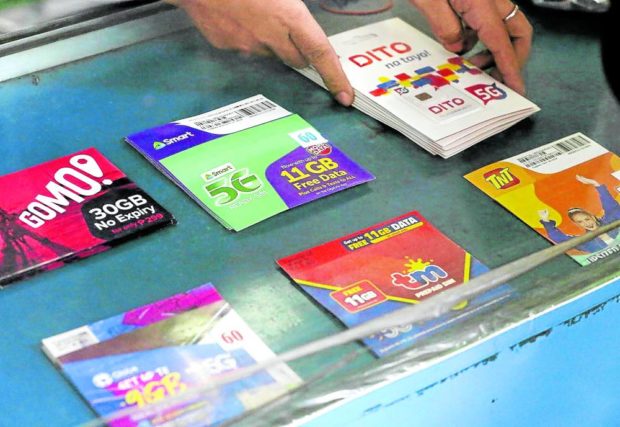
This file photo displays different SIM cards issued by various telecommunication companies in the Philippines. – Justice Secretary Jesus Crispin Remulla is urging Congress to hasten the crafting of the implementing rules and regulations (IRR) for the SIM Card Registration law so that it can already be implemented. Philippine Daily Inquirer / Richard A. Reyes
MANILA, Philippines — The Senate and the House of Representatives should expedite crafting the implementing rules and regulations (IRR) for the SIM Card Registration law so that it can already be implemented.
This was the call of Department of Justice (DOJ) Secretary Jesus Crispin Remulla to Congress, saying the new law would be a key tool against child online exploitation in the country.
He said telecommunication companies have been instrumental in increasing child online exploitation cases in the country as perpetrators can do their business without fear of being discovered since they use prepaid SIM cards, which can easily be bought and discarded.
“Umiiwas talaga ang mga telco kasi pinagkakakitaan nila ito. Sana naman ay magkaroon sila ng konsensya at pabilisin na natin [ang IRR],” Remulla told reporters on Thursday.
(Telcos are skirting blame since they are profiting from this. I hope they will have a conscience and let’s speed up the crafting of the IRR.)
“We’re asking Congress, the Senate and the House to speed up the working out of the IRR para dito sa SIM Card Registration para immediately maging executory na at ma-identify na natin ang lahat ng perpetrators,” he added.
(We’re asking Congress to expedite the IRR so that the law can already be executory and we can already identify all the perpetrators.)
READ: SIM card registration law to take effect before end of 2022, says Poe
Remulla issued the appeal after a meeting with United Nations Special Rapporteur Mama Fatima Singhateh, where they talked about child online sexual exploitation in the Philippines.
During their meeting, he also brought up several problems that hinder the fight against child exploitation, including “very restrictive” money laundering mechanisms.
According to the DOJ chief, payment solutions play a significant role in combating child exploitation but payments for such illicit content usually do not breach money laundering limitations.
“Hindi sila sakop ng mga limitations ng money laundering kaya ang hirap hulihin kaagad. Tapos na ‘yung crime bago mo pa mamalayan, ma-backtrack. Eh preventive aspect, ito ang dapat nating trabahuhin diyan,” he said.
(They do not fall under the limitations of money laundering. That’s why they are hard to catch. The crime has already been done before you know it but we should be working on the preventive aspect of it.)
Sharing database of sexual predators
Remulla also proposed that countries share databases of individuals with records of child sexual exploitation to prevent them from doing their illegal activities in other countries.
He lamented how some perpetrators caught in the Philippines were later discovered as sexual offenders or booked for sexual exploitation. He noted that the lack of a shared database has left the Philippines off-guard.
“There should be an alarm whenever anybody tries to enter that country who has that intention and it should be a worldwide alarm against these people who are already in the blacklist,” Remulla aid.
“If the alerts were earlier given to us upon entry, upon the advance passenger system, then at least we could’ve avoided their presence here because the world should be smaller for people who engage in child exploitation and all the countries should be on call to share the database so that none of them would ever leave their borders and travel to another country to do what they do,” he added.
Filtering tool for consumers abroad
Remulla further suggested the placement of filtering mechanisms in countries identified as top consumers of online child sexual content.
“You talk about press freedom or freedom of communication but when the content already involve online child exploitation, there should be a way of filtering it,” he said.